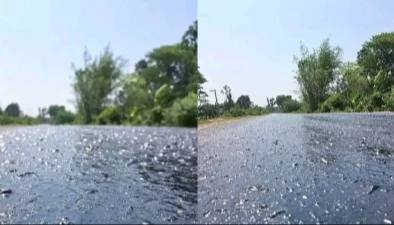Jannatul Islam and Tawfikul Islam
Published:2024-04-29 11:27:12 BdST
Experts push for PMB as heat melting roads
As the country is in the throes of a brutal heat wave, road surfaces have melted in several districts as most highways were constructed with traditional bitumen, which cannot withstand the extreme heat, experts say.
They also suggest using polymer modified bitumen (PMB) to protect the highways amid extreme weather.
The PMB represents a group of road bituminous binders specifically designed and manufactured to improve the durability of asphalts and increase road traffic safety through the addition of specific polymers to the mix.
The mercury is now hovering above 40 degrees Celsius in most districts of Dhaka, Khulna and Rajshahi divisions with this season’s highest 42.7 degrees Celsius recorded in Chuadanga district twice.
However, experts said the melting of road surfaces outside Dhaka in the temperature from 37 degrees Celsius to 42.7 degrees Celsius is not normal, suspecting that tar might have been used in those roads instead of asphalt.
They suggested using PMB for road construction amid global warming. This type of bitumen is also used in the US and neighbouring India for longer durability of roads.
Noting that the quality of PMB goes down if it is kept stored for many days, the experts underscored the need for using PMB produced in the country instead of going for imports.
Prof M Hadiuzzaman, an infrastructure expert and a teacher at the Bangladesh University of Engineering and Technology, said the standard of polymer modified bitumen is fine and its heat-tolerant capacity is also high.
He, however, said the bitumen costs much if imported.
Generally, 60-70 grade bitumen, whose melting point is 48°C-52°C, is used for road construction. The melting point of asphalt produced by state-run Eastern Refinery is 52°C-58°C.
However, the melting point of PMB is over 70 degrees Celsius.
Bangladesh needs to ensure a sustainable communications system for becoming a developed country by 2041, the experts said, underling the need for using PMB for constructing roads and highways used by heavy vehicles.
The existing rules allow vehicles having a maximum capacity of 18 tonnes to ply country’s roads. However, vehicles carrying as high as 40 tonnes are plying those violating the rules.
The experts said if the roads are constructed with PMB, vehicles with 50 tonnes to 70 tonnes will be able to run on those.
Polymer modified bitumen is being used for carpeting the Dhaka-Rangpur highway as part of the second phase of the South Asia Subregional Economic Cooperation (SASEC) project.
Roads and Highways Department’s Additional Chief Engineer Waliur Rahman said the engineers should prefer PMB for the betterment of future connectivity of Bangladesh.
“Temperatures will continue to rise and the next year might see it cross 45 degrees Celsius. So, we have to move towards PMB ultimately,” he said.
Waliur, also the project director of SASEC road connectivity project-2, said this type of bitumen causes the melting of road surfaces.
“The softening point of PMB is above 70 degrees Celsius. As a result, PMB will not melt even at high temperatures. PMB is also being used in the road layer in some places in the SASEC-II road project,” Engineer Waliur said.
Bitumen researcher Nazmus Sakib said the melting of the local road surface is expected as the country is experiencing a very severe heat wave.
“There’re two issues – the use of bitumen and then unnatural heat wave across the country. Most national highways, including Dhaka-Sylhet and Dhaka-Chattogram, ones and roads under SACEC projects, use PMB. Other local roads used traditional bitumen whose tolerance power is comparatively low,” Sakib, an associate professor at the Islamic University of Technology (IUT), said on Sunday.
The engineer, who specialises in research on bitumen, mentioned that engineers will prefer penetration-grade bitumen in future to local testing and demand.
“In most of the highways, the engineers use PMB in wearing course dipping into two inches. Out of this, 6-8 inches remain untouched. For ensuring the durability of roads, the use of PMB that we found in Dhaka-Sylhet highway should be increased,” he said.
Unauthorized use or reproduction of The Finance Today content for commercial purposes is strictly prohibited.


